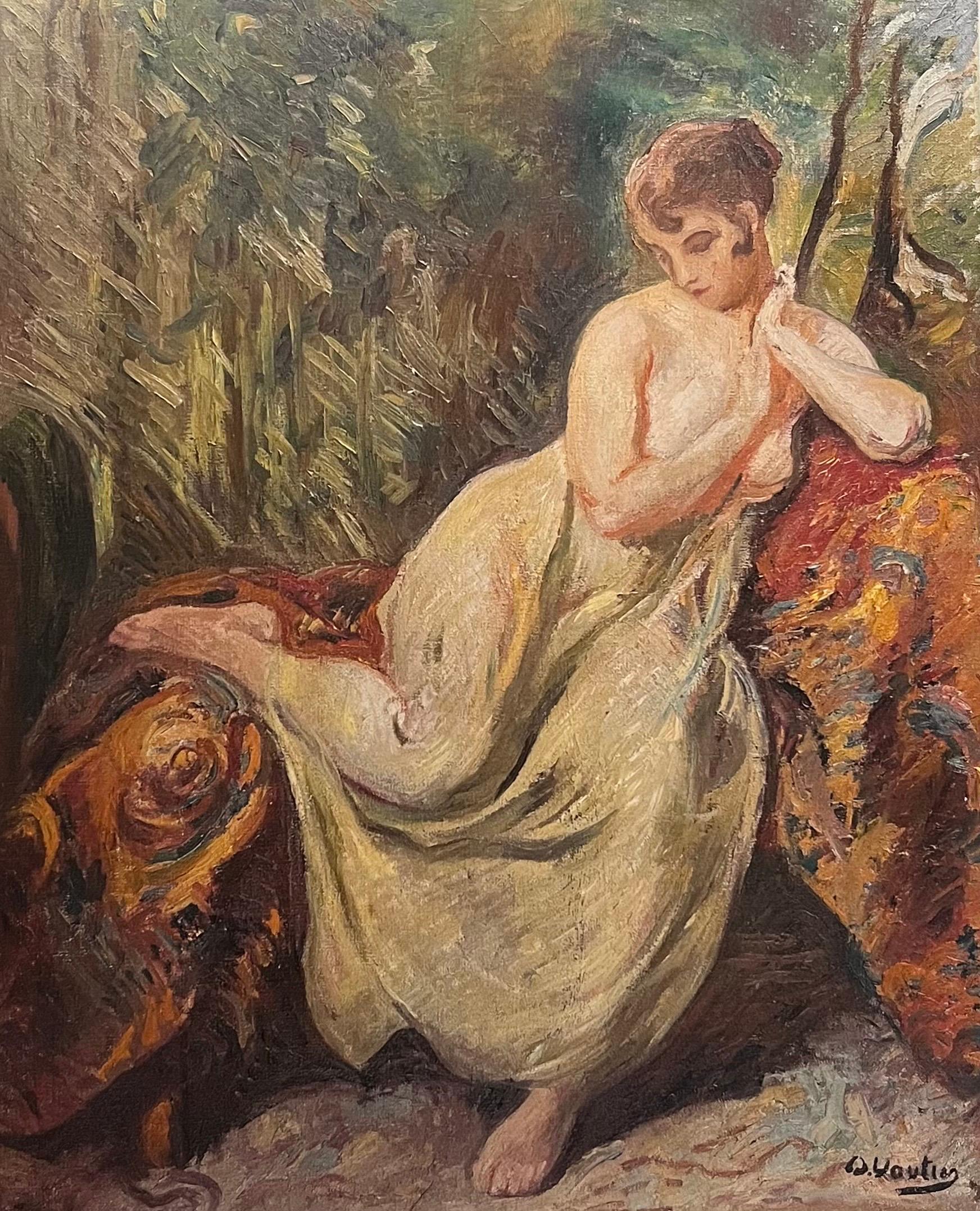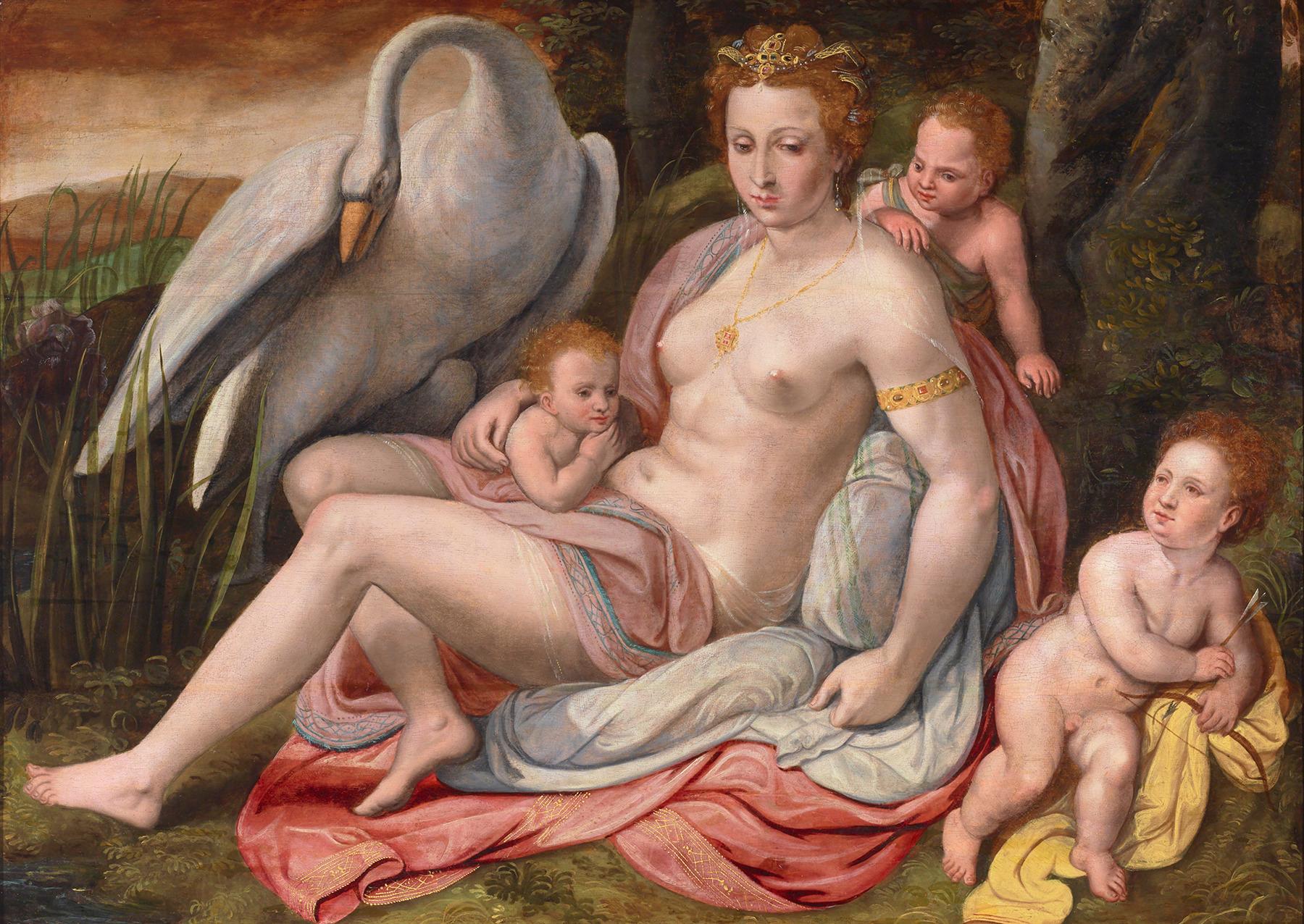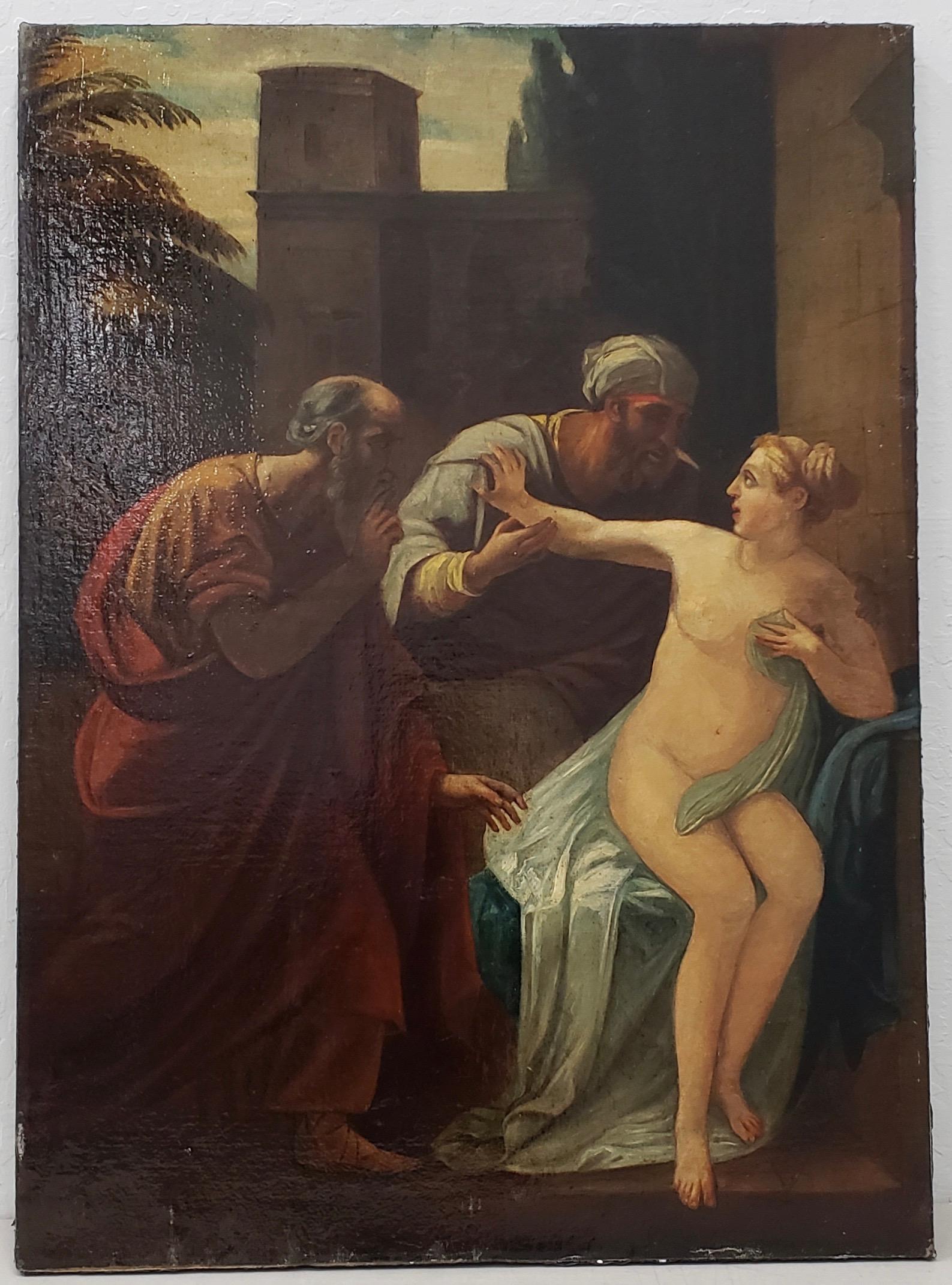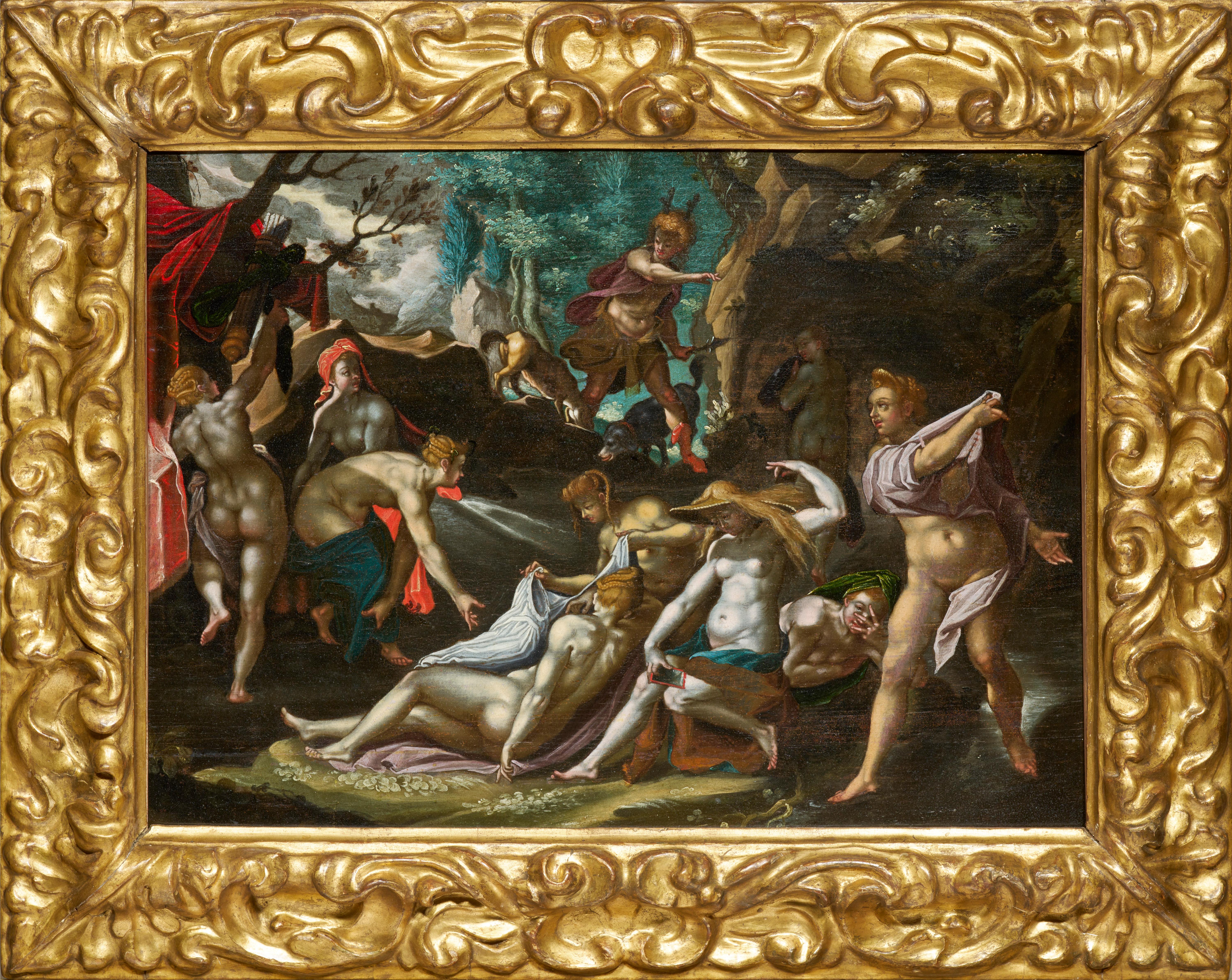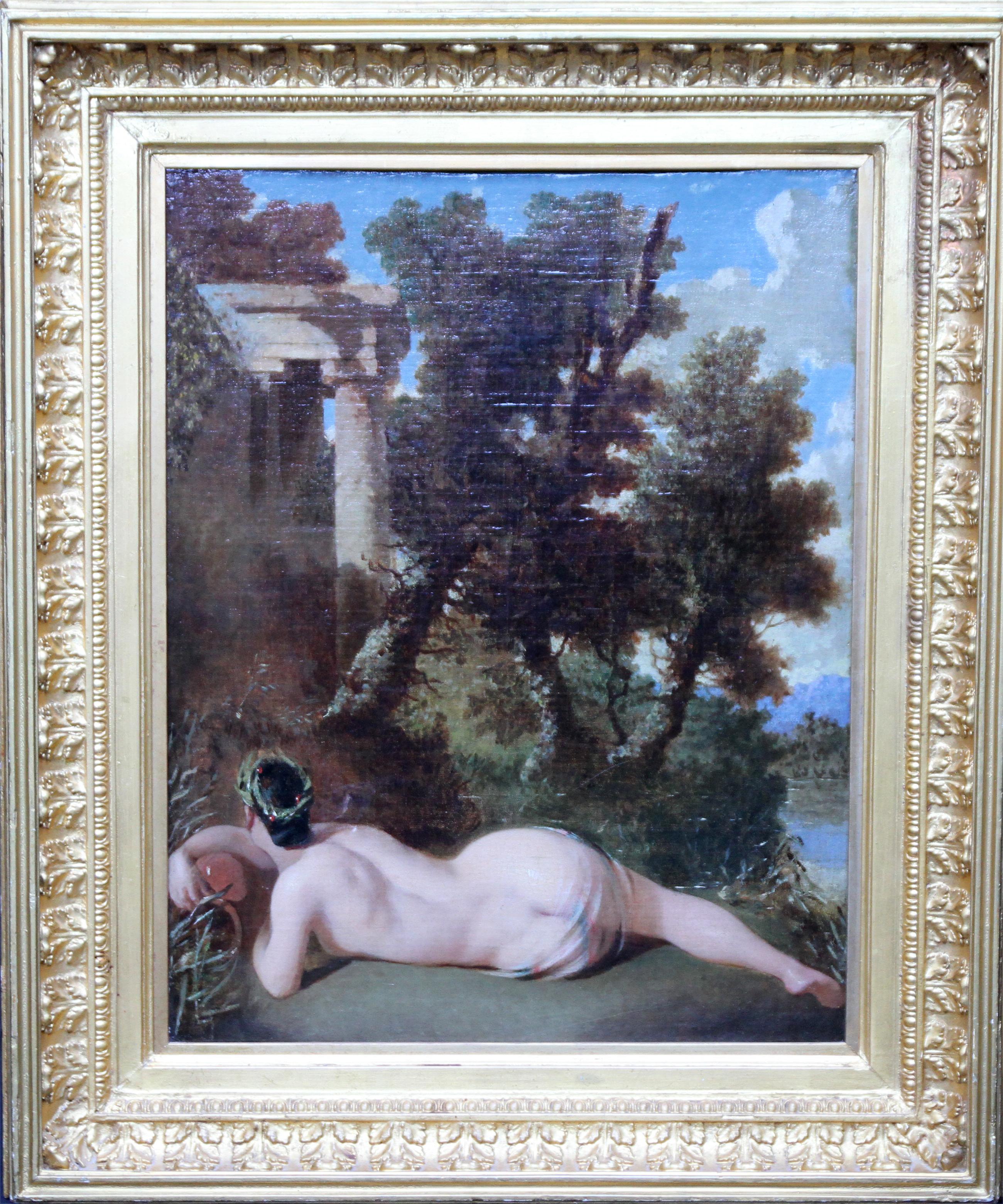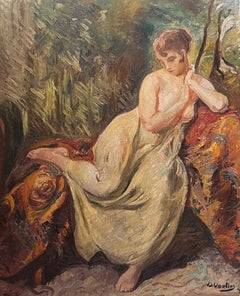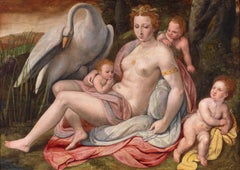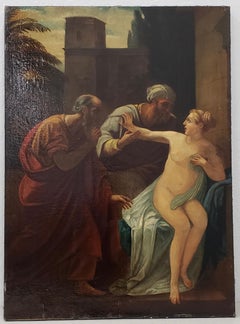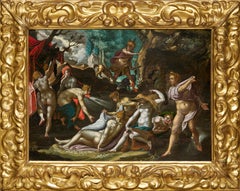Items Similar to Venus Adonis Cupid Chiari 17/18th Century Paint Oil on canvas Old master Italian
Video Loading
Want more images or videos?
Request additional images or videos from the seller
1 of 20
Venus Adonis Cupid Chiari 17/18th Century Paint Oil on canvas Old master Italian1680-1720
1680-1720
$6,928.76
£5,090.03
€5,850
CA$9,513.41
A$10,662.91
CHF 5,582.18
MX$131,573.88
NOK 70,122.56
SEK 66,007.60
DKK 44,514.18
Shipping
Retrieving quote...The 1stDibs Promise:
Authenticity Guarantee,
Money-Back Guarantee,
24-Hour Cancellation
About the Item
Giuseppe Bartolomeo Chiari (Rome 1654–1727)
Venus with Adonis and Cupid
Oil on canvas 41 x 49 cm - with frame 58 x 65 cm
The delightful subject of the painting on display here is taken from numerous classical sources, including the poem Metamorphoses, in which the Latin poet Ovid recounts the passion between Venus, goddess of beauty and love, and the beautiful mortal Adonis.
Madly in love with her beloved, thanks to the help of an arrow shot by Cupid, the goddess decided to follow the handsome hunter on his hunt, no longer caring about her charms and her usual occupations.
Despite Venus' constant exhortations to be careful during the hunt, one day the proud Adonis unfortunately met his death, wounded in the leg by a wild boar. The painting does not depict the tragic ending of the story but the moments leading up to it, with Adonis determined to leave despite Venus's languid embrace and Cupid's futile attempts to hold him back.
The goddess is depicted in a classical style, semi-nude with only a drape covering her pubic area. The painting, of particular quality and beauty, dates back to the early 18th century in Rome and is traditionally attributed to Giuseppe Bartolomeo Chiari (Rome 1654-1727), or, for the sake of caution, to an artist working in his prolific workshop.
It is a typical composition of his, exhibiting a measured balance and majestic classicism, where the influences absorbed from Carlo Maratti, his teacher in Rome, are clearly evident. Upon the death of his master in 1713, he became his official heir, both in terms of his close correspondence in painting style and the success he achieved among the great Roman collectors.
Already highly regarded at the end of the 17th century, Giuseppe Bartolomeo Chiari established himself as a painter for the most influential families: notable commissions include two frescoes for the Barberini family (depicting the Sun Chariot and the Birth of Pindar in their palace) and a ceiling with the apotheosis of Marcantonio II Colonna for the Colonna family.
ADDITIONAL INFORMATION:
The work is sold complete with a pleasant frame and is accompanied by a certificate of guarantee and authenticity, with a descriptive iconographic card.
We take care of and organise the transport of the works purchased, both in Italy and abroad, through professional and insured carriers.
It is also possible to view the painting in our gallery in Riva del Garda by appointment; we would be delighted to welcome you and show you our collection of works.
If the work is purchased by non-Italian customers, an export permit will be required, which takes approximately 10-20 days to obtain. Our gallery will take care of the entire process until the permit is obtained. All costs for this procedure are included.
Please contact us, without obligation, for any further information.
- Attributed to:Giuseppe Bartolomeo Chiari (Rome 1654–1727)
- Creation Year:1680-1720
- Dimensions:Height: 22.84 in (58 cm)Width: 25.6 in (65 cm)
- Medium:
- Movement & Style:
- Period:
- Condition:
- Gallery Location:Riva del Garda, IT
- Reference Number:1stDibs: LU988116530412
About the Seller
4.9
Gold Seller
Premium sellers maintaining a 4.3+ rating and 24-hour response times
Established in 2017
1stDibs seller since 2018
246 sales on 1stDibs
Typical response time: <1 hour
- ShippingRetrieving quote...Shipping from: Riva del Garda, Italy
- Return Policy
Authenticity Guarantee
In the unlikely event there’s an issue with an item’s authenticity, contact us within 1 year for a full refund. DetailsMoney-Back Guarantee
If your item is not as described, is damaged in transit, or does not arrive, contact us within 7 days for a full refund. Details24-Hour Cancellation
You have a 24-hour grace period in which to reconsider your purchase, with no questions asked.Vetted Professional Sellers
Our world-class sellers must adhere to strict standards for service and quality, maintaining the integrity of our listings.Price-Match Guarantee
If you find that a seller listed the same item for a lower price elsewhere, we’ll match it.Trusted Global Delivery
Our best-in-class carrier network provides specialized shipping options worldwide, including custom delivery.More From This Seller
View AllToilet Venus Albani Mythological 17/18th Century Paint Oil on canvas Old master
Located in Riva del Garda, IT
Toilet of Venus Francesco Albani (Bologna 1578 - 1660) Follower of
Oil on canvas 64 x 96 cm In fine gilded frame 83 x 121 cm.
The painting on offer, depicting ‘Venus’ Toilet',...
Category
17th Century Old Masters Paintings
Materials
Oil
Jupiter Antiope Van Dyck Mythological Paint 17/18th Centuty Oil on canvas Art
Located in Riva del Garda, IT
Anthoon van Dyck (Antwerp 1599 - London 1641) follower
Large canvas depicting ‘The Myth of Jupiter and Antiope’
(Ovid's Meramorphoses, Book VI)
Oil on canvas
116 x 150 cm. - with f...
Category
17th Century Old Masters Paintings
Materials
Oil
$17,244 Sale Price
20% Off
St Joseph Paint Oil on canvas Lombard School 17th Century Religious Old master
Located in Riva del Garda, IT
Lombard School of the 17th century
St. Joseph with Flower Stick
Oil on oval canvas
92 x 70 cm.
In antique frame 106 x 85 cm.
The work shows us an intense image of St. Joseph, portrayed according to the classical iconography that sees him as a mature man holding in his hands a staff from which lilies bloom, symbol of the Virgin's purity.
This iconographic attribute also alludes to his figure as God's chosen one as Mary's future husband. According to the apocryphal gospels, the Virgin had grown up in the Temple of Jerusalem, following a monastic lifestyle, and when she reached marriageable age, each of the suitors was given a dry branch...
Category
17th Century Old Masters Paintings
Materials
Oil
$4,803 Sale Price
20% Off
Madonna Child Maria Sassoferrato Paint Oil on canvas 17th Century Old master Art
Located in Riva del Garda, IT
Giovan Battista Salvi known as 'il Sassoferrato' (1609 - 1685) circle/ workshop
Madonna with sleeping child
Oil on canvas
84 x 66 cm - Framed (19th century) 112 x 95 cm
The paintin...
Category
17th Century Old Masters Paintings
Materials
Oil
$9,731 Sale Price
20% Off
Christ Angels Pietro Da Cortona Paint Oil on canvas Old master 17th Century Art
Located in Riva del Garda, IT
Christ surrounded by angels in the desert
Circle of Pietro da Cortona, born as Pietro Berrettini (Cortona 1597 - Rome 1669)
Oils on canvas (66 x 50 cm. - in frame 80 x 64 cm.)
The ...
Category
17th Century Old Masters Paintings
Materials
Oil
$8,499 Sale Price
20% Off
Madonna Scarsella Paint Oil on canvas Old master 16/17th Century Raffaello Art
Located in Riva del Garda, IT
Ippolito Scarsella, known as Lo Scarsellino (Ferrara, around 1550 - 1620) workshop
Altarpiece depicting the Madonna and Child, St. James the Greater and the donor in armour
Technique: oil on panel
Measurements: 93 x 72 cm./with frame 109 x 86 cm.
Provenance: Prato, Farsetti, auction of 28.10.2016, lot 261 (link)
A majestic Madonna in Glory occupies the upper register of the canvas, seated on a blanket of iridescent clouds surrounded by angels, flanked by a cherub who scatters flowers contained in a cornucopia towards the infant Christ as a sign of abundance, naked and supported with both hands from the mother.
In the lower part of the composition stands the figure of San Giacomo Maggiore, one of the twelve apostles, standing on the right side of the altarpiece, represented dressed in a humble tunic; one arm holds the open Gospel book, while the other holds a cross pilgrimage staff.
A particular aspect of the table is the presence in the central part, to indicate its importance, of the figure of the donor, kneeling on a cushion, with his hands joined in prayer and his face observing the Virgin in an attitude of devotion, while on the opposite lectern is placed a prayer book; depicted with the features of a young leader in armor, with a sword and a rich iridescent red cloak, elements which, combined with his authoritarian composure, enhance his ennoblement.
Unlike the medieval altarpieces, the knight is here included in the space of the painting and has proportionate dimensions to those of the other characters, returning to all intents and purposes in the sacred scene, with a pose that cannot but evoke the detail of the 'Montefeltro altarpiece' made by Piero della Francesca for Federico da Montefeltro, kneeling in front of the sacred group in the guise of a leader.
On the right, the view recedes into depth highlighting the background of an urban landscape set on a hill behind which a mountain range stands out, with the peculiarity of the arched aqueduct that runs along the entire landscape. Presumably among these expanses were the donor's own possessions and his hometown.
It is a quality table, imbued with the late Mannerist style still resistant in the second half of the 16th century, characterized by a 'sweet and affable religiosity, rendered through a manner of studied simplicity and grace', which highlights the unmistakable stylistic and chromatic connotations of the produced...
Category
16th Century Old Masters Paintings
Materials
Oil
$10,465 Sale Price
20% Off
You May Also Like
The Reflection of The Model by Otto Vautier - Oil on Canvas 81x65 cm
Located in Geneva, CH
Otto Vautier is a renowned Swiss painter, born in 1863 in Düsseldorf. He was influenced by a family of artists and developed his style during his training in Munich and Paris. Vautie...
Category
Early 20th Century Old Masters Nude Paintings
Materials
Canvas, Oil
Leda And The Swan By Workshop Of Bartholomaeus Spranger
Located in New Orleans, LA
Workshop of Bartholomaeus Spranger
16th Century Flemish
Leda and the Swan
Oil on panel
Retelling one of the most legendary Greco-Roman mythological tales, this exceptional oil on...
Category
16th Century Old Masters Nude Paintings
Materials
Oil, Panel
Mid 19th Century "Susanna And The Elders" After The Old Master by Martinelli
Located in San Francisco, CA
Outstanding Mid 19th century old master "Susanna and the Elders" after Martinelli
Brilliant old master painting of Susanna and the Elders.
Original oil on canvas. Dimensions 26.5" ...
Category
Mid-19th Century Old Masters Nude Paintings
Materials
Canvas, Oil
$1,950 Sale Price
58% Off
Diana and Actaeon, a Mannerist painting after Joseph Heintz the Elder
Located in PARIS, FR
This painting seduced us with its rich colors. Depicting Diana and her companions surprised by Actaeon, it was inspired by an engraving by Aegidius Sadeler II after a painting by Jos...
Category
17th Century Old Masters Nude Paintings
Materials
Oil, Wood Panel
Old Master Dutch Female Nude Arcadian Landscape - 19th century art oil painting
By (Attributed to) Isaac de Mucheron
Located in London, GB
An original oil on canvas which is attributed verso to Isaac Mucheron with figure by Vandveldt. The scene depicts a nude in an Arcadia classical landscape with ruins. Fresh colour an...
Category
Early 19th Century Old Masters Landscape Paintings
Materials
Oil
Gathering in antique Ruins, a monogrammed painting by Jan van Haensbergen
By Jan Van Haensbergen
Located in PARIS, FR
Jan van Haensbergen was a painter of the Dutch Golden Age and a pupil of Cornelius van Poelenburgh (Utrecht 1594 - 1667). The painting we are presenting is inspired by Poelenburgh’s landscapes from his Italian sojourn. The dreamlike atmosphere of this Gathering in antique ruins appealed to us. Against a backdrop of antique ruins, three draped characters (perhaps bathers) are sitting in a circle, greeting a fourth character walking towards them.
Their tranquility contrasts with the bustle of the other characters in the background. They constitute a vivid illustration of otium, this leisure time that allows us to realize our full potential. With this Arcadian landscape, Jan van Haensbergen invites us in turn to leave the hustle and bustle of everyday life behind, to take a break, to enjoy the present moment chatting with close friends…
1. Jan van Haensbergen, a landscape and portrait painter of the Dutch Golden Age
Jan van Haensbergen was born in 1642 in Gorinchem, a town in southern Holland to the east of Rotterdam. He was a pupil of Cornelius van Poelenburgh, and began by painting landscapes inspired by those of his master, in an Italianate style. Between 1668 and 1669, he was registered at the Guild of Saint Luke in Utrecht.
In 1669, he moved to The Hague, where he joined the Confrérie Pictura, an artist society founded in 1656. His portraits, which became his main activity as a painter after settling in The Hague, were strongly influenced by Caspar Netscher (Prague or Heidelberg 1639 - The Hague 1684), whom he met in The Hague and whose son Constantijn became his son-in-law by marrying his daughter Magdalena.
In addition to his work as an artist, Van Haensbergen was also an art dealer, probably helped by his appointment as Dean of the Confrérie Pictura, where he also teached.
2. Description of the artwork and related paintings
This painting seems to us to be a kind of allegory of otium, that quiet bliss promised by Epicurus. It might even evoke an Epicurean proverb: "It is better to lie on the naked ground and be at ease, than to have a golden carriage and a rich table and be worried" .
Three draped young people - two men and a woman in the background - are seated in a circle, greeting a fourth figure walking towards them, hair disheveled and body draped in a towel as if drying off after a bath, indicating the need for prior purification to fully enjoy this rest. Their nonchalance contrasts with the bustle of the various characters in the background.
The composition is punctuated by successive diagonals, and opens onto a landscape on the right, with a succession of mountainous planes. This painting is typical of the Italianate works produced by Van Haensbergen in the 1660s under the influence of Cornelis van Poelenburgh...
Category
17th Century Old Masters Landscape Paintings
Materials
Oak, Oil
